How to Insure Your Fishing Boat in B.C.

What kind of insurance do you need for a fishing boat in B.C.? Is it different from the insurance for other types of boats? And what about the fish you catch—are they covered too?
Insurance requirements for fishing boats can vary depending on whether you're fishing on a lake or you’re out on the ocean.
The basics of boat Insurance
Much like auto insurance, boat insurance offers financial protection against damage to your boat, liability for injuries or property damage caused by your boat, and coverage for personal effects.
Standard boat insurance policies typically include:
- Physical damage coverage: Protects against damage to your boat due to accidents, theft, or vandalism.
- Liability coverage: Covers legal liability for injury or damage to others if you’re at fault in an accident.
- Medical payments coverage: Helps pay for medical expenses if you or your passengers are injured in a boating accident.
- Uninsured/underinsured boater coverage: Offers protection if you’re involved in an accident with a boater who doesn’t have sufficient insurance.
How is insurance different for fishing boats?
Fishing boats, whether used for commercial purposes or recreational fishing in B.C., have unique needs that set them apart from other types of watercraft. Here’s what you need to consider:
1. Commercial vs. recreational fishing boats
The first distinction to make is whether your fishing boat is used for commercial purposes or recreational fishing. Commercial fishing boats require a different level of coverage than recreational boats.
- Commercial fishing boat insurance: If your boat is used for commercial fishing in British Columbia, you’ll need a commercial boat insurance policy. This policy typically covers the boat, equipment, and the crew, as well as liability for accidents that occur during commercial operations. Commercial policies often include:
- Hull and machinery Insurance: Covers damage to the boat and its machinery.
- Protection and indemnity (P&I) insurance: Covers liability for injuries to crew members, damage to other vessels, and environmental damage.
- Cargo insurance: Covers the catch you bring in, ensuring you’re protected if something happens to the fish before they reach the market.
- Recreational fishing boat insurance: For those who fish for pleasure rather than profit, a standard boat insurance policy might suffice, but you may still need specialized coverage depending on your boat and how you use it.
2. Fishing equipment coverage
Fishing boats often carry specialized equipment, such as rods, reels, sonar systems, and tackle. These items can be expensive and a basic boat insurance policy may not fully cover them.
If your fishing boat is equipped with high-value gear, you should consider adding an endorsement or rider to your policy that specifically covers fishing equipment. This ensures that if your gear is lost, stolen, or damaged, you’re not left paying out of pocket.
3. Catch coverage
One of the unique aspects of insuring a fishing boat, particularly for commercial purposes, is the concept of catch coverage. This insurance protects the fish you catch from various risks, including damage during transportation or spoilage.
While this coverage is needed for commercial fishermen, recreational anglers may not need this level of coverage. If you’re participating in fishing tournaments where the value of the catch is significant, some insurers offer policies that can cover your prize catch.
Freshwater vs. saltwater: How location affects insurance
The environment where you fish—whether in freshwater lakes or saltwater oceans—can impact the type of insurance you need for your B.C. fishing boat.
- Lake fishing (freshwater)
Fishing on lakes and other freshwater bodies typically involves smaller boats, less exposure to extreme weather, and fewer risks than ocean fishing. However, that doesn’t mean you can skimp on insurance.
- Coverage needs: Freshwater boats still require comprehensive insurance, including physical damage and liability coverage. Since freshwater bodies are often more accessible, there’s also a higher risk of theft or vandalism, so having coverage for these events is crucial.
- Winterization coverage: If you live in a region where lakes freeze over, consider a policy that covers winterization. This protects your boat during the off-season when it’s stored and not in use.
2. Ocean fishing (saltwater)
Ocean fishing comes with its own set of challenges and risks, including rough waters, storms, and the corrosive effects of saltwater on your boat.
- Increased coverage limits: Saltwater fishing boats often require higher coverage limits due to the increased value of the boat and the higher risk of damage. Policies for ocean-going vessels typically include coverage for damage caused by saltwater corrosion and more extensive liability coverage.
- Storm coverage: If you’re fishing in the ocean, especially in regions prone to hurricanes or other severe weather, it’s vital to ensure your policy includes coverage for storm damage.
- Navigational limits: Some ocean fishing policies have navigational limits, meaning they only cover your boat within certain geographic areas. If you plan to venture far from shore, ensure your policy covers you in those areas.
Other considerations
Beyond the type of boat and where you fish, there are a few other factors to consider when choosing insurance for your fishing boat.
1. Policy exclusions
It’s important to read the fine print of any insurance policy to understand what’s excluded. Common exclusions for fishing boat insurance might include damage caused by wear and tear, lack of maintenance, or intentional acts. Knowing these exclusions can help you avoid surprises when you need to file a claim.
2. Safety and training discounts
Some insurers offer discounts if you’ve completed a boating safety course or if your B.C. boat is equipped with certain safety features, such as life jackets, fire extinguishers, or GPS tracking devices. Investing in safety can not only protect you and your passengers but also reduce your insurance premiums.
Having the right insurance for your B.C. fishing boat is essential. The type of insurance you need depends on several factors, including whether your fishing is commercial or recreational, the value of your equipment, and where you plan to fish.



